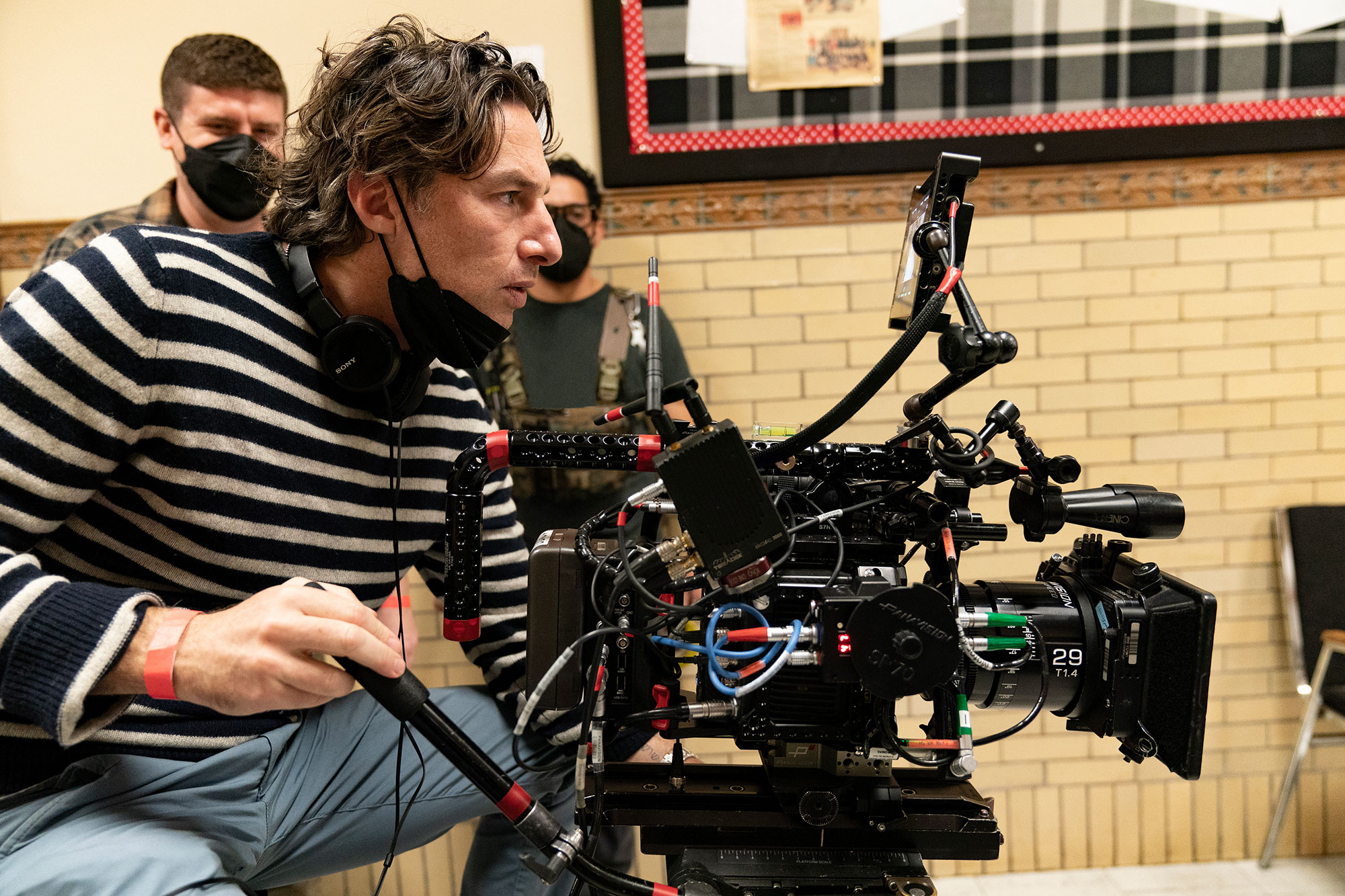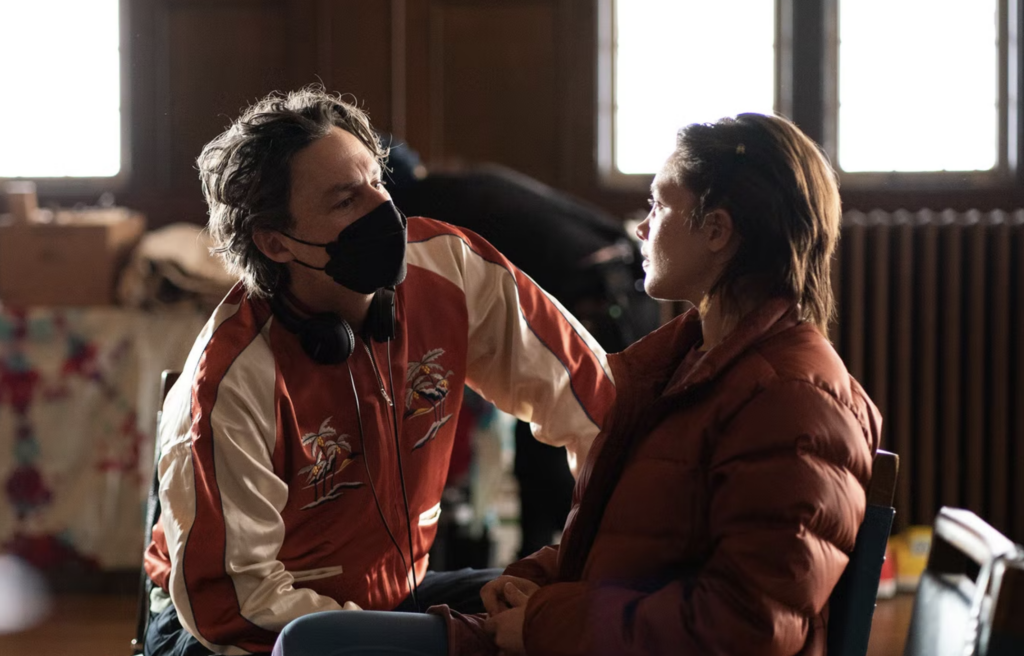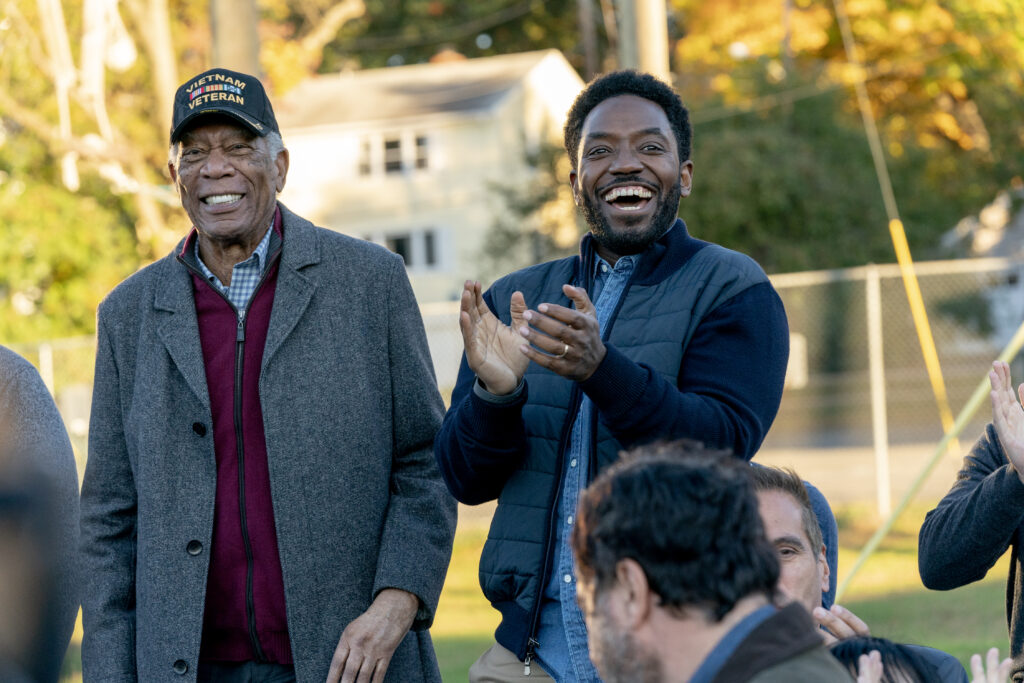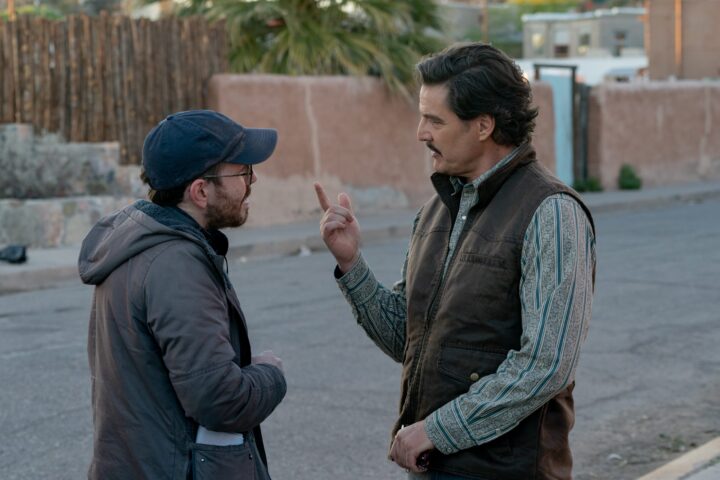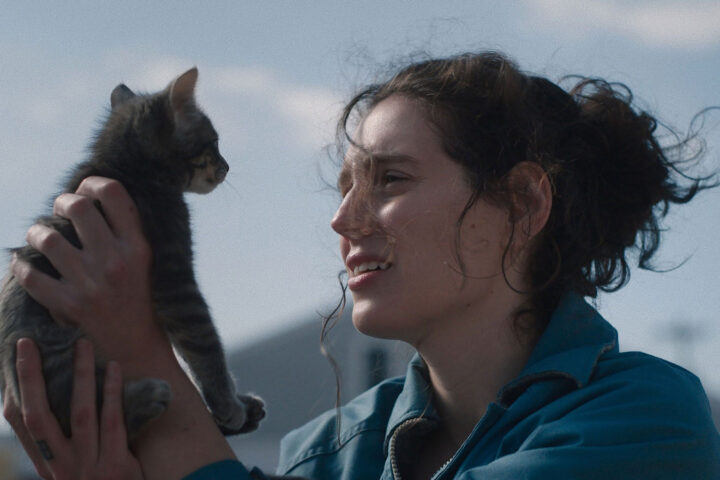On his fourth directorial outing, actor-writer-filmmaker Zach Braff has crafted a remarkable portrait of friendship and healing between a pair of very unlikely characters, played by an equally unlikely—and very winning—Florence Pugh and Morgan Freeman. In A Good Person, Pugh is a New Jersey bride-to-be whose involvement in a tragic accident changes her trajectory from an optimistic future to a haze of oxycontin addiction and world of psychological hurt. Into this spiral comes Morgan Freeman in one of his best performances as a former cop in recovery, whose own haunted life is inextricably linked to that of the troubled young woman.
Braff’s pairing of the brilliant, self-trained 27-year-old actress and the 85-year-old master thespian was itself a masterstroke. But what transpires onscreen between the actors in their expansive drama—which truthfully confronts substance abuse, grief, and showing up for those in need—is something of a miracle. Bristling, raw and redemptive, their push-pull performances illuminate the false starts and required rescues on the hard road to healing. Often, they convey a quandary: How are we supposed to help people when we have our own baggage and don’t know how? Both stars and the filmmaker earn the film’s pathos, sans melodrama, in a film that reminds us of a recent, now faded era of Hollywood films about adults grappling with real life issues.
I recently caught up with Braff at Chicago’s Peninsula Hotel to chat about the film’s themes of friendship and recovery, as well as Pugh’s marvelously emotive portrait—sorrowful and hopeful—in a role written directly for her.
Lee Shoquist: You have written a smart collection of characters beautifully played by your ensemble of actors. Let’s start with Florence. She is terrific in everything and all the time. Sometimes it seems she is working in support of conceptual films like Don’t Worry Darling, Midsommar and Black Widow. I suppose even in her Oscar-nominated Little Women performance she was supporting an Alcott classic. This time I really felt I was seeing her as an ordinary human being; a normal person in the real world. She is so good here that I felt she was a co-author of the film. I loved the close-ups you gave her directly into the mirror and camera.
Zach Braff: Yes! We actually had to cut a hole in the wall.
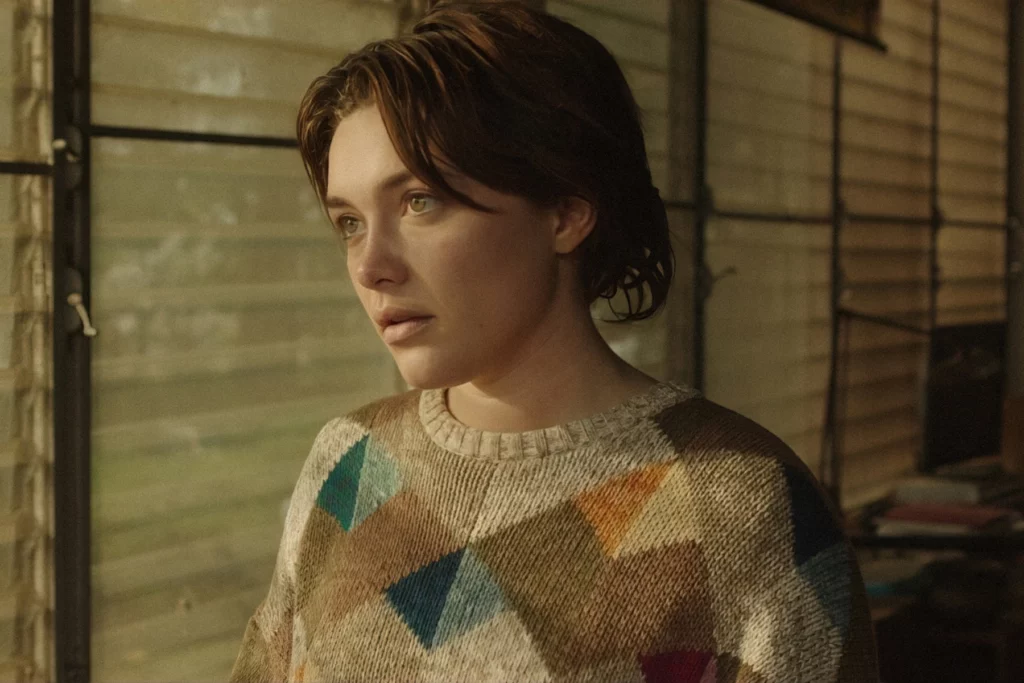
Did you? I know you wrote this for her and I wonder if you can share your perspectives on her emotional performance. It was great to spend time with her as a real person who is struggling.
That’s so wonderful! Wow, that was beautifully said. I felt the same way. Florence is extraordinary but I had yet to see her play- she plays a regular Jersey girl in this in contemporary America, and I think the film is really about modern-day America and addresses a lot of things that are in the zeitgeist. And yes she is very raw. There is no heightened reality. It is just her, sometimes with no make up on or make up to make her appear a bit more, for example, in withdrawal. But she is just stripped down raw in tight close-ups and you just cannot take your eyes off her. She is just mesmerizing.
Yes, I felt almost as if she was feeling and not acting, per se. This seemed important to this subject matter.
Yes, she is just all feeling. She is next level. And the woman has never been in an acting class or even spoken to an acting coach. She just has this natural ability and talent.
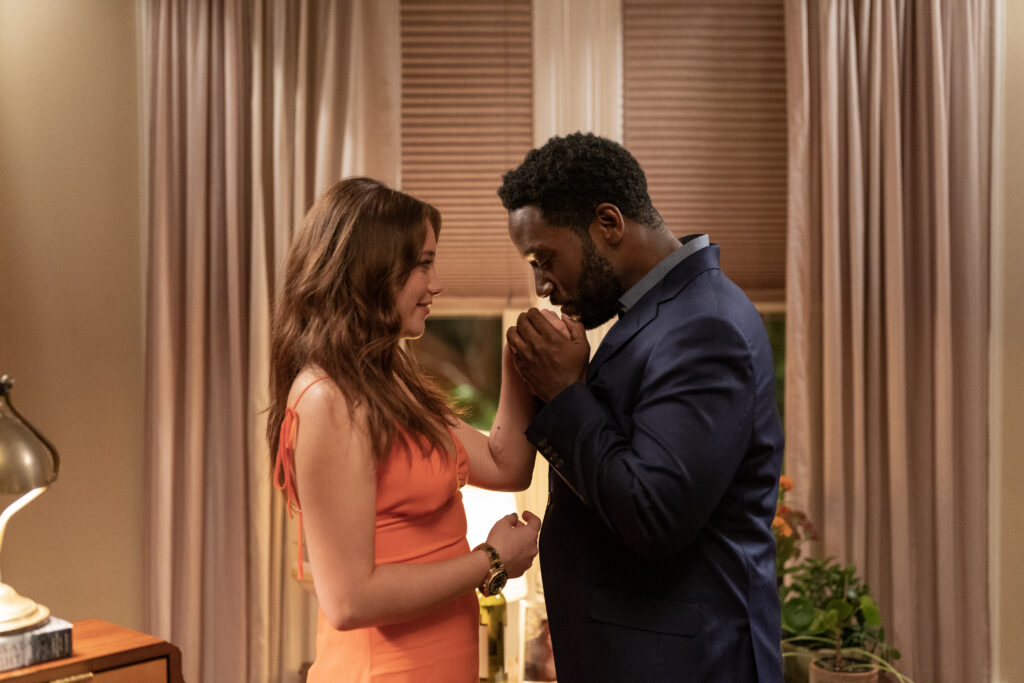
You spent quite significant time early in the film developing the relationship between Florence and Chinaza Uche. This is very important as we will later feel the impact of its loss.
We called that the prologue.
There is this delayed gratification that happens when they actually reconnect near the end of the movie. I was sitting in the theater waiting for that scene to come. I knew it was coming…
Did you know it was coming? I know the audience wants it…
That was not my way of saying I found it predictable! I didn’t.
I think the audience wants it and I, as the writer, wanted it. When I started out I did not know who that visitor was going to be. It could have been Morgan or even her mom. But when I was writing I was like ‘It’s got to be Nathan.’
There’s a simple moment where she touches him that is very affecting.
Yes and it’s devoid of score and blocking. It is just two people sitting across from each other at a table silently and being intimate.
I felt the tension about whether there would be anything happening again between them. Even the moment where she goes down to the basement for the last time and he is on the other side of the door and we wonder, as that door closes, if he will be standing behind it.
When we were shooting that scene in recovery I whispered in his ear and said ‘I want you to hope that she will raise the idea of reconciling.’ So when that tear fell from his eye it really was the actor realizing that this was not a ‘let’s get back together’ moment.
You can’t drive someone to recovery or out of grief. You can be there and be loving and listen.
One aspect of the film that I found quite compelling was the notion of what we can do for a person close to us who may be struggling. You know you should do something or have to do something. But what? What will help? I felt this with the supporting cast, and Molly Shannon does very well on this front with Florence’s Allison, her daughter. Certainly Morgan Freeman dealing with Celeste O’ Connor’s teen character Ryan. It’s this way of showing up for someone but not knowing if it helps. It’s hard to reach someone who has to go through something themselves. But you still have to be there.
You have to be there and be supportive but you can’t do anything. They have to take the reins. That is the most classic thing. You can’t drive someone to recovery or out of grief. You can be there and be loving and listen but Molly Shannon’s character is wrestling with what to do and she does not have the skillset, and in fact enables her daughter’s issues by giving her pills. At that moment, Florence is saying ‘Mom, I need help. Please help me find a program or something.’ And Molly misinterprets it and says ‘Don’t worry, I got you more pills.’ Her daughter disappearing freaked her out. The devil that she knows—her daughter on the couch on oxycontin—is better than the one which she does not know, which is her daughter disappearing.
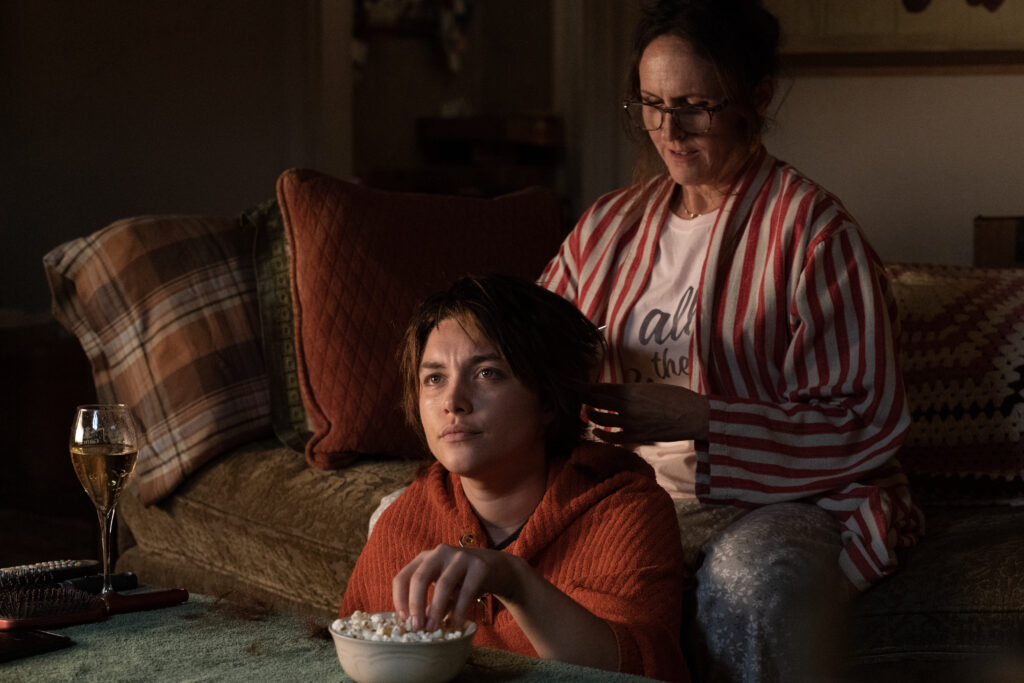
I also found the film thoughtful in how both of our lead characters, even though they are in recovery and one has been clean for ten years, are very much- it’s an in the moment thing and they might very easily fall back. In fact, they contemplate it all the time. This was not a standard ‘work the program and move on’ sort of film.
There are some people that do, and then some that battle it and have been sober for decades and they tell you that every single day they battle it. There is a spectrum of people and how their addiction lands for then. So I wanted to represent that spectrum.
You carefully construct both characters’ lives and worlds in the first part of the film. You delay them getting together for about forty-five minutes before the stories begin to intersect. You took time to build them both.
Me too. I did delay it. First of all, there was the prologue but I did not want to rush. I wanted the audience to be fully aware of where Morgan and Celeste were, and also to be aware of where Florence and Molly were. The tension builds and then there is that wonderful scene where he pulls her back into AA. But for me, one of my favorite scenes is when they finally—and the audience is ready for this—sit across that diner table and they are both very guarded. And they are tiptoeing about what to say or not, and it is awkward. I love that scene. Even though there are not huge laughs or emotions, it is just two people that are terrified of each other but also need each other.
What’s the line he has? ‘I’ve been a cop for forty years and an addict for fifty years…’
Yes, she lies about being on pills. And he says ‘I’m going to ask you again.’
I think a big part of my own life and moving on from something is that you are not going to get any traction, or anywhere, until you are 100% unabashedly honest with yourself.
You have written a very insightful screenplay and given Florence some very potent dialogue. Two of my favorite lines included ‘I’m a fucking junkie’ and ‘It was my fault.’ When they arrive in the film both are important.
Yes, she has to finally take responsibility. I think a big part of my own life and moving on from something is that you are not going to get any traction, or anywhere, until you are 100% unabashedly honest with yourself. Or myself. I should just speak for myself. So I wanted to do that. She has been in denial for so long and then in the recovery program she got clarity.
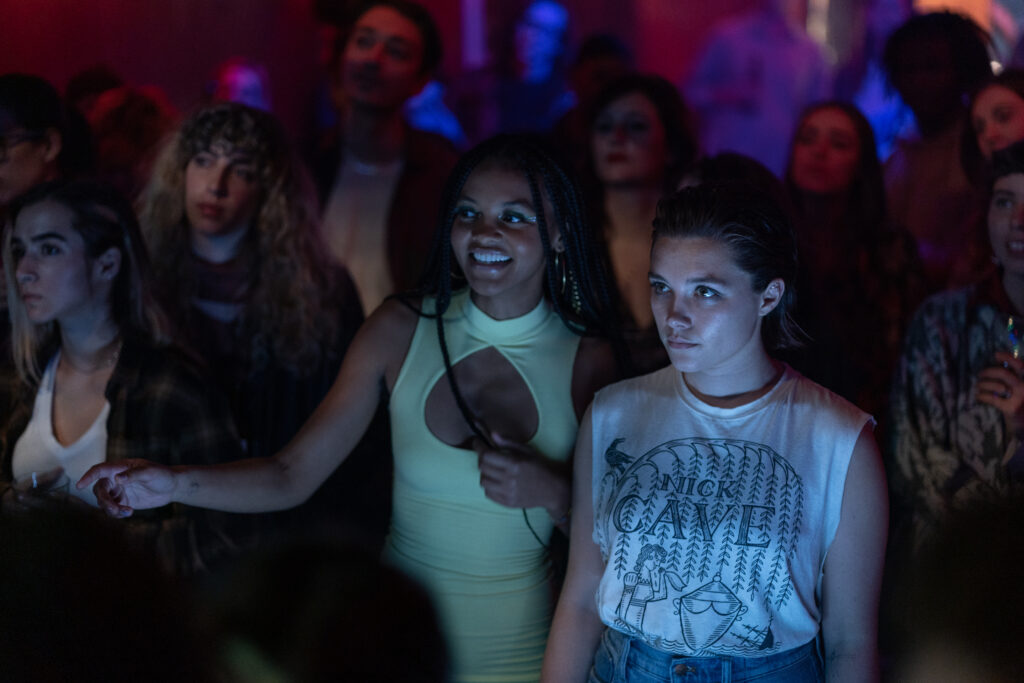
Tell me a bit about Celeste, who makes a big impact in this film.
I want to say she is a discovery although I know that she was in Ghostbusters. I don’t think anyone has ever seen her perform like this.
It is a tricky role. And much of it if you looked on the surface you might think she was going through some teen angst with her grandfather, but what she is going through psychologically is very, very heavy. That scene of recognition with Florence is just a great piece of acting, really between all three of them.
It really is. And they are all playing from different spaces. And there is also that small moment of Florence understanding that Morgan has been lying and telling a different story. It is a very hard part and she has to play a teenager over a three-year progression. For an adult that may not be as much but for a teenager it is quite a lot. She plays the ages perfectly.
Her Ryan character eventually gets to the point where she is thinking that she has no purpose or point and no friends and has become promiscuous, because she is finding some dopamine in that perhaps, but all of a sudden she has an epiphany that she has a purpose and will do what she believes her mom would have wanted, which is to try to get them back together. That is a very teenage way of thinking—that she can save the day, like her mother is speaking to her from heaven and urging her to do this. Celeste is going to be a huge star.
“I know being a paralegal is a good job but he’s supposed to be with her.”
(Laughs)
Again, somebody trying to do the right thing! She’s trying to help.
And she’s also proud that she now has some knowledge that being a paralegal is a good job!
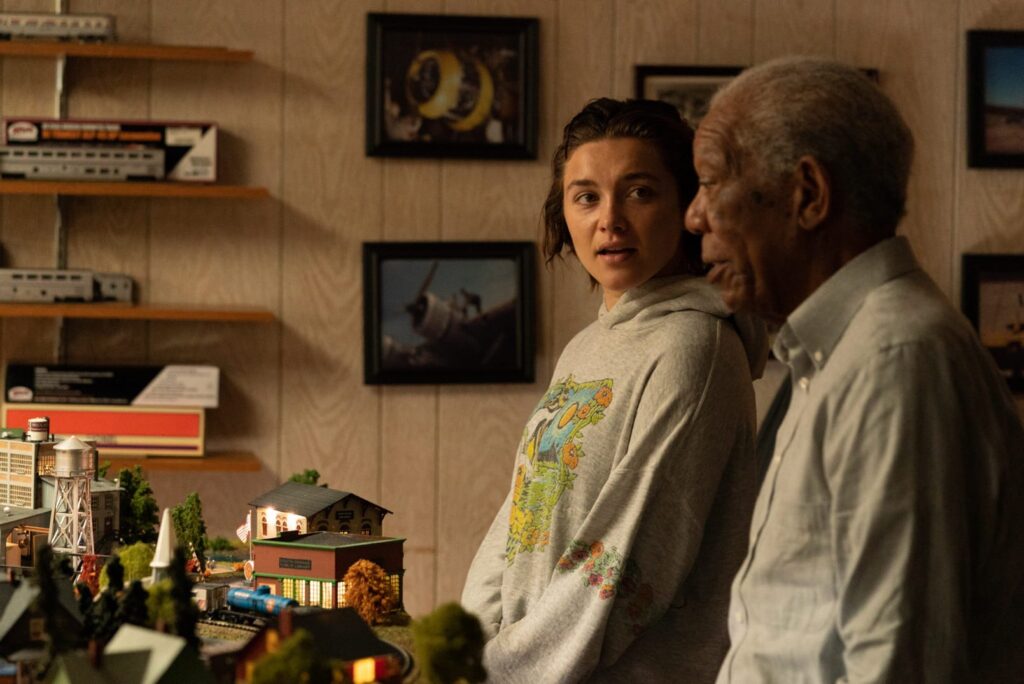
Let’s talk for a moment about Morgan’s monologue at the end of the film where explodes and lets go of what he’s been thinking and feeling. In that moment, there is a profound dynamic between Morgan and Florence.
Yes, all of that stuff he has been holding down.
All of that stuff. He says, ‘You are a waste of a soul.’ Can you share a bit about shooting that moment with him?
It was very intense. It was hard. It was late at night and it was cold. They both delivered in such an incredible way. Not only is he playing drunk, but he is playing a man who has not had a drink in 10 years and has just downed a half a bottle of whiskey. We know from everything we have learned that he is a really bad, dangerous drunk. He has told us what he has done while drinking in the past. So there are many things to play there. I did not want him so drunk that you could not understand him because he has got to make his points, but he so brilliantly plays a man who is just slurring the right amount and is able to get his point out. He has been holding that rage down, which is what he confesses to her. But it is his faith and his belief in God, and his belief in service from the program, that he was being tested. But when he finds them in fucking Williamsburg and she is on heroin and Ryan has passed out and is being essentially date raped, he is finally ready to fucking say it all.
(Morgan’s voice) is like an instrument that you would love to hear.
In that moment, I perceived Florence’s Allison as being equally heartbroken to discover that he has fallen off the wagon and that she has contributed to that, as she is hurt over the words he is saying to her about their predicament.
She is! That is a real moment. That is powerful when he comes back to say the final piece about all of the stats he knows. She sort of goes, ‘You drank?’ She is heartbroken for him. Even though he has said all of this stuff to her she is heartbroken—for him.
Morgan’s voice is so special, particularly later in the film when he is reading a letter. I think he may have the best voice in the movies. Perhaps this goes all the way back to The Shawshank Redemption. There’s immediate gravitas to his voice and a stoicism that seems to always be there.
Yes, it is like an instrument that you would love to hear.
Let’s shift a bit and talk about some of the tech credits in the film. I thought the decision to shoot in widescreen was quite interesting. Very often we think about the format being used for epic films, but not always about films that deal with people. In a drama like A Good Person, what is interesting about a frame that wide is that you can very intentionally carve out space between people in unique ways and suggest degrees of emotional distance.
I love anamorphic. You know when you go to a museum you just respond to a certain type of art out of all the different types of art? I just really respond to the widescreen aspect ratio. I love that rectangle. To me that is the coolest frame to put a movie in and I really like it. Back in the day it was traditionally used for CinemaScope movies. And I have always loved bringing that- well, Garden State was Super 35 and not 2.40:1, but I love just bringing that feeling to smaller movies.
Yes and we don’t usually consider how that frame can be used to detail how people relate to each other. So dealing with characters in that wide of a ratio becomes a question of how you are going to move them around within it and what does that mean, right?
Yes! It is funny because now so many things are streaming in 16 x 9 and the streamers are pushing filmmakers to fill that whole (television) frame because people (if you shoot in anamorphic) people think ‘Why are you cutting off my frame?!’ There is something very magical about the aspect ratio of anamorphic framing. And our cinematographer Mauro Fiore is just a genius. He has done giant films and actually came to us from the last Spider-Man movie. But he does such beautiful work. I was nervous that he wouldn’t be able to shoot us in 26 days because we had very limited gear, crew and time. I kept saying to him, ‘You’ve seen the schedule, right?’
Can you share thoughts on making a film like this—for adults or thoughtful moviegoers—during a time in Hollywood when we are dealing with films opening every week like Shazam! Fury of the Gods and Ant-Man and the Wasp: Quantumania? Adult-oriented films have been crowded out.
They have been! But that’s why I hope and pray that people go to see this movie. My brother’s mother-in-law turned to him after she saw it and said ‘Nobody makes movies like this anymore.’ So when MGM was bought by Amazon I thought ‘Oh no, they are going to put this right on streaming.’ But kudos to MGM because they are releasing it. We are on 500 screens and it is the same weekend as John Wick: Chapter 4. But this is counter-programming because for everyone that John Wick is not right for, although obviously there is overlap, this is an offering for those people. I am just so pleased that MGM is giving us a theatrical release.
It reminded me of the films I grew up on in the 80s and even into the early 90s. There were so many character-centric dramas.
James Brooks!
James Brooks. I also thought a bit about Lawrence Kasdan’s Grand Canyon.
Thank you! I thought about Terms of Endearment a lot.
Certainly. One of my favorite films.
Me too!
So much talent has gone to the streaming marketplace because that is where the eyeballs and the money are. So many brilliant writers are now writing television.
It would be great if we could get back to those, wouldn’t it?
It would. And it’s tricky because a couple things have happened. First, the studios are nervous about whether people are going to come to see them and second, so much talent has gone to the streaming marketplace because that is where the eyeballs and the money are. So many of those brilliant writers are now writing television.
So much of the mainstay of what we formerly thought of as commercial cinema has dried up.
So much has! Remember the romantic comedy? (Laughter)
I was also thinking the other day that there are no love scenes in movies anymore.
Me too! I was telling a young person the other day, ‘Do you realize that when I was growing up and you went to see an R-rated movie there was always a weird, montange-like sex scene?’ It was part of an R-rated movie!
I saw An Officer and a Gentleman again recently, which I loved when I was growing up, and I was astonished in 2023 to see A-list actors performing such open and unguarded, explicit scenes. It seems like so much more of a big deal today than maybe it did at the time.
Yes! It’s okay when it’s the right movie! In the right movie it is justified and you are in it and you get it. But they used to be this thing where it was time for the R-rated sex scene and it’s so funny that this was a thing!
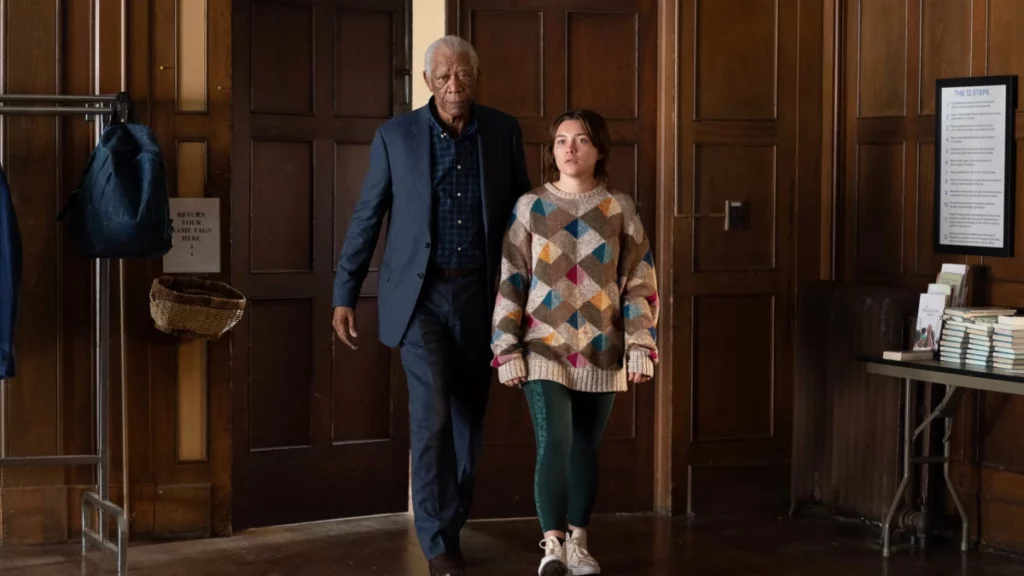
Let’s talk about the title of the film: A Good Person. I thought that was an absolutely great line: ‘I’m a good person. I know God isn’t fair, but I never thought he could be so cruel.’ He mentions his faith. It made me think about what constitutes a good person in today’s world and how hard it can often be to serve as one. In many regards, we live in a completely cluttered, toxic world. Perhaps it’s a post-Covid phenomenon. People in public are shorter and more abrupt and dismissive, even in casual interactions. Confrontational. Certainly online communities can be very bitter and negative. How hard do you think it is to just maintain a sense of goodness or kindness amidst all of this?
That’s a great question and it has not been phrased to me that way. I do think it’s challenging. I think the online world is incredibly snarky and toxic. And the pandemic made us live in that town way more. I will leave it up for the audience’s interpretation what the title means and what it is about, although I will remind you also that Florence has one sentence about it also when she is sharing with Zoe Lister-Jones’ character about how her father abandoned her and how she always wrestled with it. And then she says, ‘I started to think that maybe some people just aren’t good.’ So they are both wrestling with the idea of whatit means to be a good person. But I agree with you that the online tenor that has become such a dominant part of our lives is so defaulted to snark.
What is the best part about your job as a filmmaker?
Getting to work with all of these incredible craftsmen and artists. I think of it as being a conductor of an orchestra. I can’t play the violin or the trombone but I get to work with the best people like Morgan and Florence and my production designer Merissa Lombardo and Dan Schalk, who cut the movie. I get to collaborate with these people that I admire and make a piece of art with them. I got one of the best cinematographers in the world to come and shoot a movie in 26 days and he is executing what has been in my brain. I got Florence saying my words. That is just such a high.
What does that feel like for you—when you know you have written those words and then you see someone of her caliber performing them?
It is incredible. To stick with the same analogy, it’s like you wrote a piece of classical music and the best violinist in the world is playing it.
It’s been fun catching up.
That was great, man. That was like an awesome speed round!
This interview has been edited for length and clarity.
